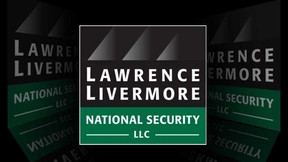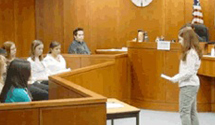Court appeals to youth seeking second chance
That's because Dake has been a volunteer at the Tri-Valley Youth Court (TVYC) in Pleasanton, where she works with teens under 18 years who have been cited for minor crimes.
Tri-Valley Youth Court is one of the agencies listed on the HOME Campaign and one of many such community youth courts operating throughout California. The TVYC serves the cities of Livermore, Dublin and Pleasanton.
Dake's responsibilities as a court attendant include calling the cases to order, maintaining order during the courtroom sessions, and escorting jury members to the jury room. Some volunteer training was required.
Dake explained that the program is strictly voluntary, offers youth a second chance and is an alternative to the traditional juvenile justice system for middle and high school teens who are first time offenders of misdemeanor or lesser crimes such as shoplifting.
The youth are judged by their peers and their court appearance is "off the record." The judges in each case are attorneys. High school-aged advocates, often college bound students, are on hand to present the cases and to provide a list of constructive sanctions that the youth are to live by, such as community service or written apologies. In some cases, teens could be required to take a tour of Santa Rita Jail or a local rehabilitation facility -- visits that can be real eye-openers for them, according to Dake.
"For most first-time offenders, there is a lot of emotion in youth court. The teens know they made bad choices and they are truly repentant," she said. "Their appearance in the court is often a life-altering experience."
Nothing like a criminal trial, the court takes place after hours, usually from 6-8 p.m. once a month. Up to 12 cases can be heard each month, four in each of three courtrooms, with deliberations taking some 15-20 minutes per case. The "jury" of their peers consists of other students, some of whom are volunteers (receiving community service college credit), and some are previous offenders, who are serving jury duty as part of the sanctions they received.
"These kids are not bad kids. They were usually caught up in the circumstance, and many times it is due to peer pressure," Dake adds. " This is a means for them to ameliorate the problem and set them on a better path."
In addition, youth court provides services to hard-to-serve youth who may have otherwise slipped through the cracks of the juvenile justice system but who have the potential to be involved with the criminal justice system well into adulthood.
The program is immensely successful, with a low recidivism rate for offenders, and a strong volunteer core.
As a volunteer judge, she listens to the advocate's presentations, and directs the defendants to the witness stand so they can answer questions from the jury. In addition, she explains to jury members their duty and gives instructions to the jury concerning the guidelines for sentencing.
Essentially, volunteer judges are to preside over the proceedings from the beginning to the end of the cases. "On a typical night, I will have three or four cases to preside over," Bothwell adds.
"I believe children are our future, and even for those that get in trouble with the law, we can still put them back on the right path by giving them the chance to redeem themselves," Bothwell said. "I enjoy this work tremendously as I believe our activities help to steer the troubled youth in a right direction."
For more information about the Tri-Valley Youth Court, go to the Community Youth Courts Web page . To donate to the HOME Campaign, go the HOME Web page .
Contact
Linda A Lucchetti[email protected]
925-422-5815
Tags
PhilanthropyCharity
HOME Campaign
Featured Articles








